Nighttime cramps are often harmless, but if they happen frequently, they may point to hidden issues in your body.
Here are the main causes that can trigger muscle spasms:
– lack of minerals (magnesium, potassium, calcium)
– dehydration
– poor circulation
If cramps keep returning, don’t postpone a visit to your doctor. A specialist can rule out serious conditions such as diabetes, thyroid disorders, or neurological problems.
Tip: Keep a journal — note how often the cramps occur, how long they last, and how intense they are. This information can help your doctor identify the cause more accurately.
Common Mistakes During Night Cramps — and How to Avoid Them
Many people simply ignore the spasm, hoping it will go away on its own. But that reaction only intensifies the pain.
Here are the most common mistakes — and how to fix them:
Mistake #1 — Staying still.
Your instinct tells you not to move, but that only prolongs the discomfort.
What to do: Gently stretch the muscle. If your calf cramps, pull your toes toward your knee — this helps the tight fibers relax.
Mistake #2 — Not drinking enough water.
Dehydration is one of the most frequent causes of nighttime spasms. In winter, it’s especially easy to forget about water since you feel less thirsty.
What to do: Drink water regularly throughout the day, even when you’re not thirsty. Staying hydrated lowers the risk of muscle cramps.
Mistake #3 — Ignoring mineral deficiencies.
Low levels of potassium, magnesium, or calcium make night cramps much more likely. Poor diet often fails to meet your body’s needs.
What to do: Add mineral-rich foods to your diet, such as:
– bananas
– spinach
– almonds
– dairy products
These simple steps can help reduce the likelihood of nighttime cramps — making your sleep calmer and more restful.












